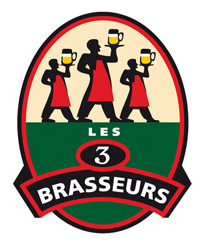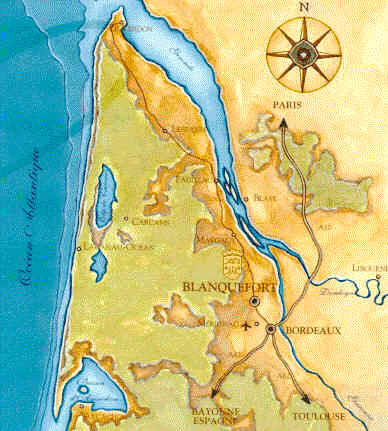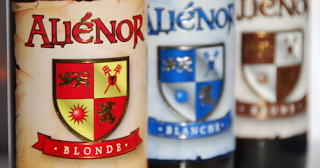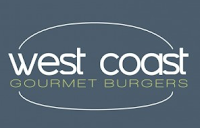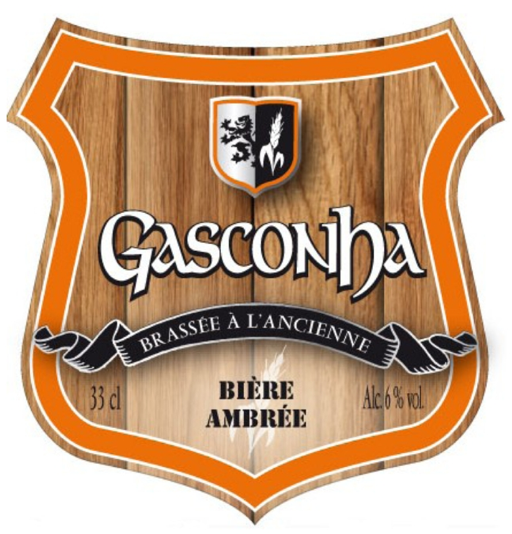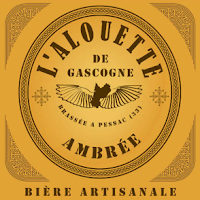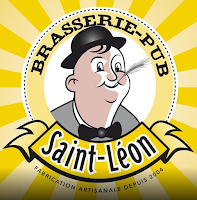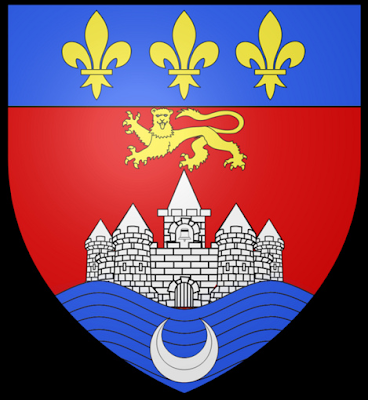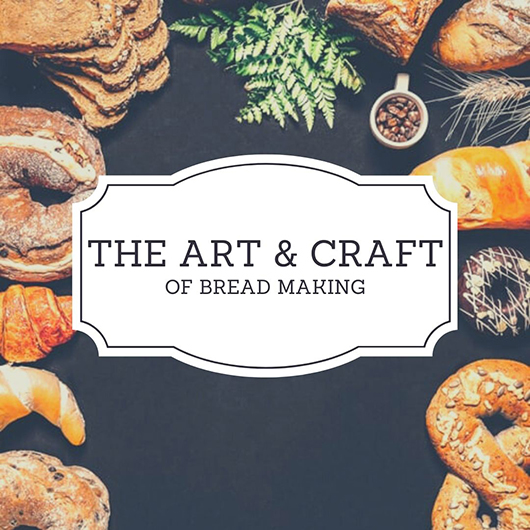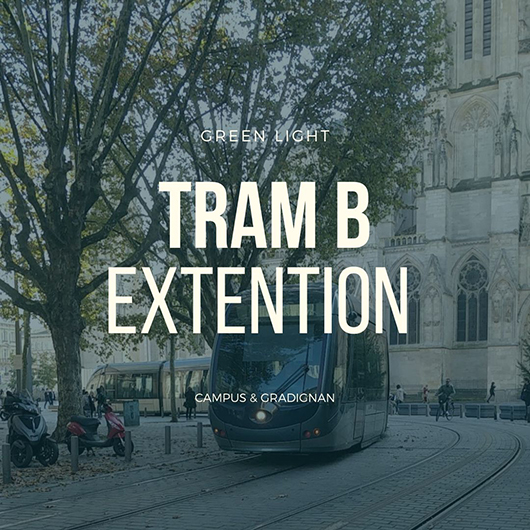
Bordeaux Expat Interview – Belinda Treloar
06/08/2013
EXPAT INTERVIEW – BEN FRANK
22/08/2013Beerdeaux. Where to get a decent pint in the world wine capital – Part II, the local brews…

“He is a wise man who invented beer” – Plato
With our spectacular summer in full swing and with the brasserie terraces of Bordeaux out for all to enjoy, the call of a frosty cold pint is never far away. Thus to mark the occasion of the Great British Beer Festival in London, International Beer Day and in celebration of beer in general it’s time for the second installment of the Beerdeaux blog.
Part 1 looked at where to pick up a variety of British and international beers as well as all the British/Irish pubs in Bordeaux. For part 2, I have spoken to all the numerous local artisan brewers who are making efforts to introduce alternative beer culture to the Sud Ouest and educate a new generation of drinkers.
The Bordeaux Scene..
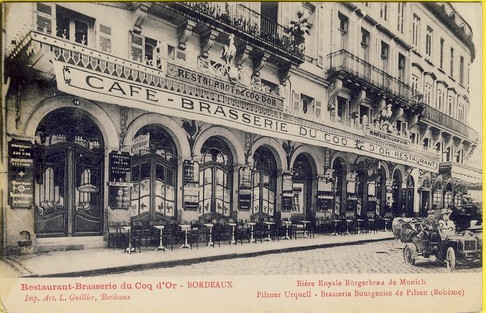 |
| La Brasserie du Coq D’Or, early 1900’s – opposite the Mega CGR cinema, rue Montesquieu |
For a city which hails itself as the world capital of wine there has always been a surprising amount of beer drinking going on. There currently are over 20 Anglo/Irish/Belgian pubs in town and an ever expanding network of funky and alternative bars. The student and music scenes are buzzing (apart from in August..) and there is a growing underground movement of organic eco-friendly cafes and brasseries. Indeed the future seems rosy for all that is beer related and particularly so for the handful of microbreweries that have recently graced our fine city. But the last 100 years has been challenging (to say the least!) for local artisan brewers and the struggle is far from over.
 |
| La Grande Brasserie de l’Atlantique, brewing the finest Bordeaux beers until 1979 |
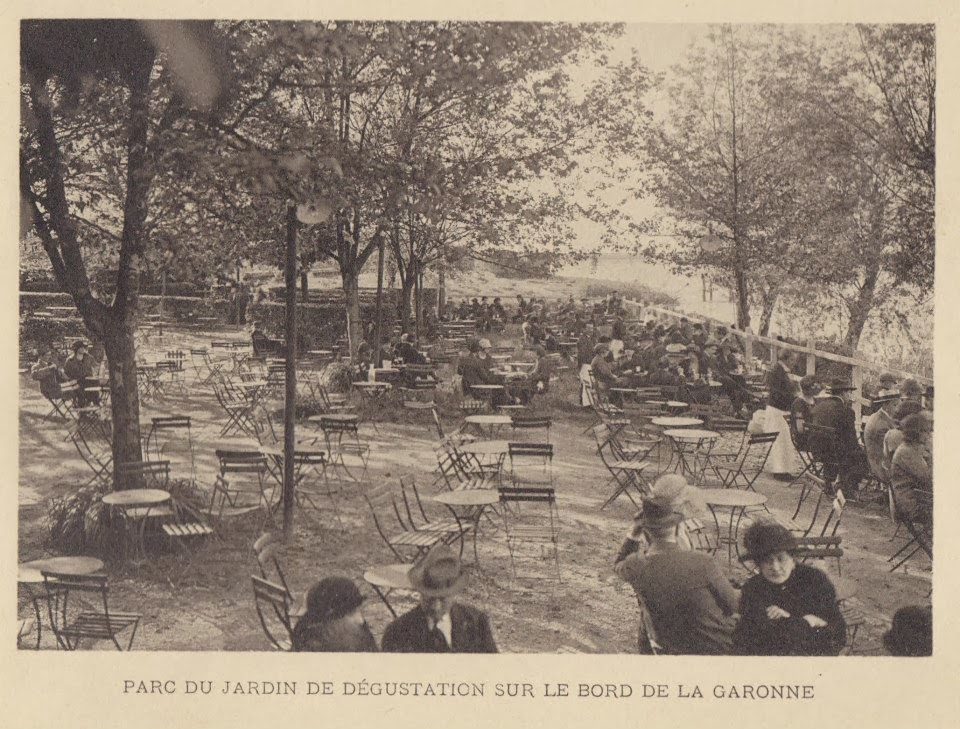 |
| The beer garden at the Atlantique brewery (Quai de Brienne) serving beers and Alsace style snacks (1923) |
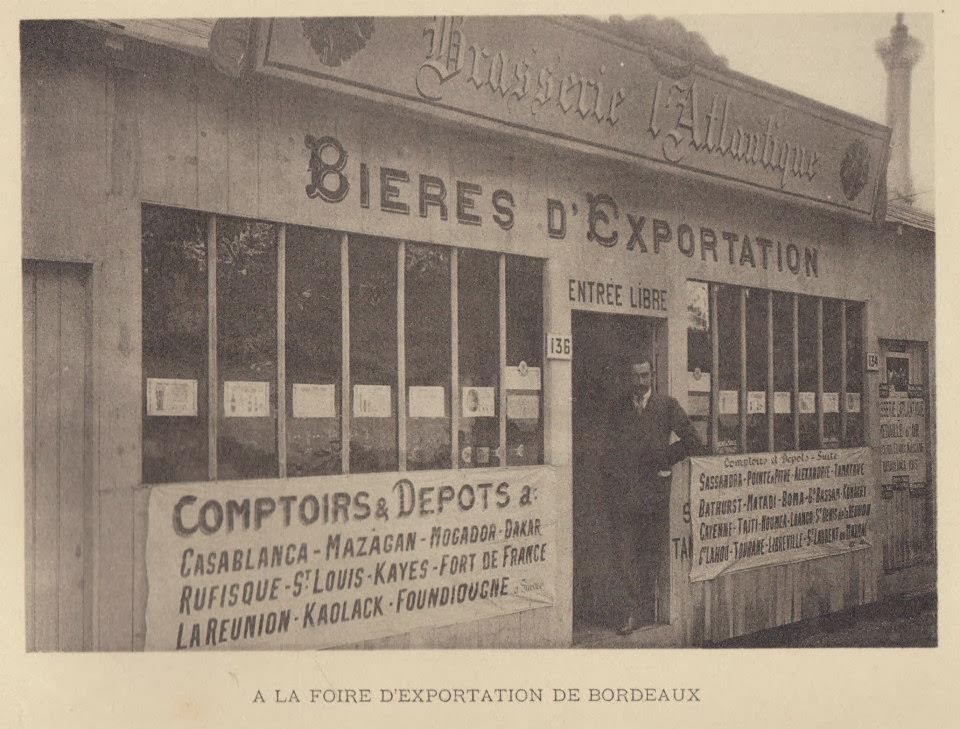 |
| Atlantique at the 1923 Bordeaux International Fair, Quinconces. Beers were being exported all over the French speaking world from the Caribbean to Madagascar and West Africa… |
The disappearance of the local brewery in France
Brewing and beer culture holds an important and often forgotten place in French cultural history. Figures from the Assiciation des Brasseurs de France state that at the start of the 20th century there were close to 3500 small brewers (with the majority located in the north and Pas de Calais). The popularity of Alsace style beers also spread to other parts of the metropole (such as Bordeaux! http://invisiblebordeaux.blogspot.fr/2014/01/la-grande-brasserie-de-latlantique.html). Professional Beerologist for Heineken Hervé Marziou suggests that many of the beer producers were Alsace residents who settled elsewhere in France to avoid the annex with Germany. Historically it was also the abbeys and monasteries who were responsible for beer production as well as holding the local monopoly. As with the UK, Belgium and the rest of the Anglo Saxon world it seems that the towns throughout the hexagon (particularly in the north) had their own local brewery.
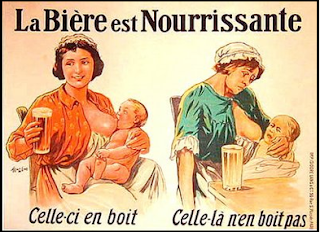 |
| Popular myth had it that downing pints was somehow great for breastfeeding Mums… |
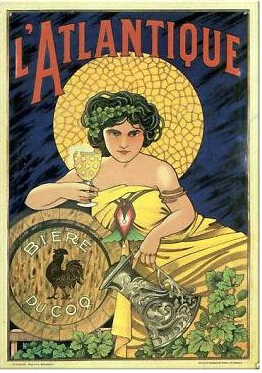 |
| Bière du Coq from the Brasserie de l’Atlantique |
 |
| A beer specially made for pregnant women |
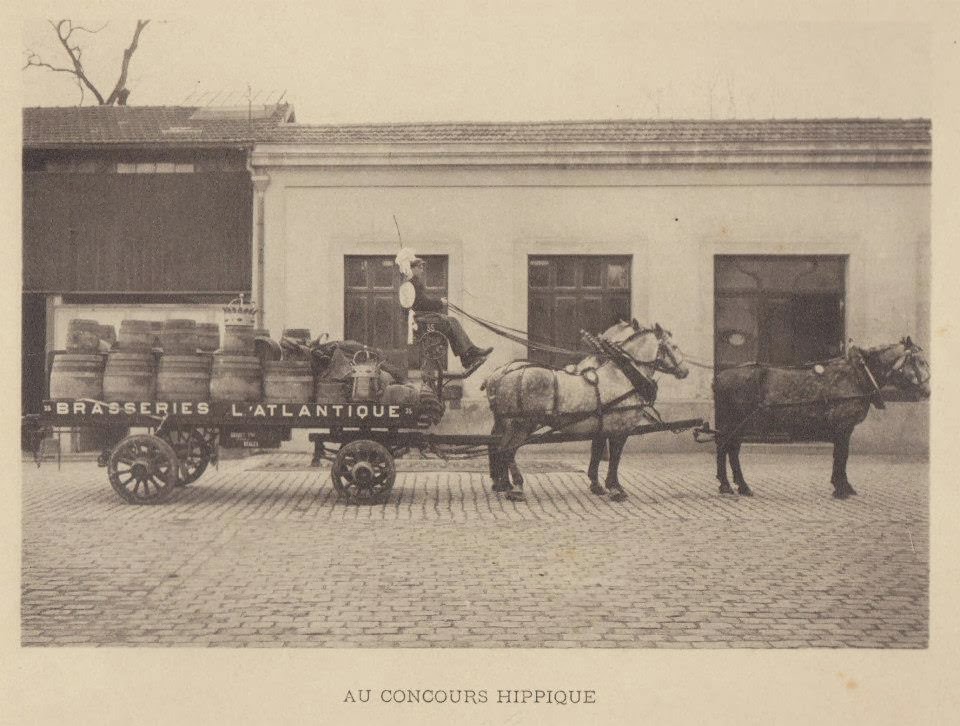 |
| Beer delivery to central Bordeaux, 1923 |
Nevertheless a variety of factors and events during the 20th century resulted in the almost total eradication of France’s independant brewing industry. WWI had a catastrophic effect wiping out a whole generation of local brasseurs with the number being reduced by two thirds. As well as the brewers themselves going to fight numerous breweries had their equipment turned into ammunition.
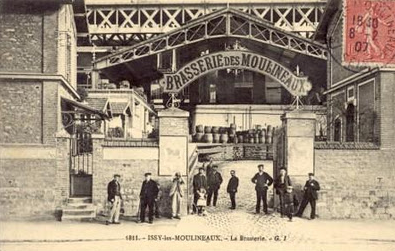 |
| Issy-les-Moulineaux, south Paris |
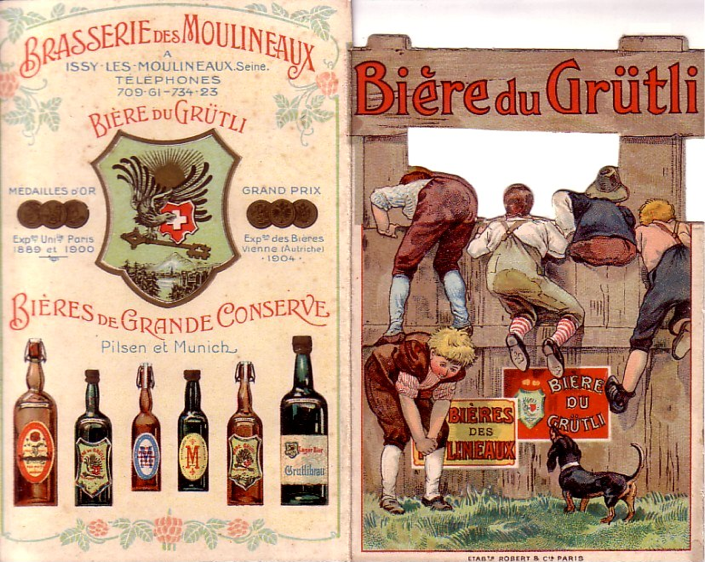 |
| Paris brewed Munich style beers |
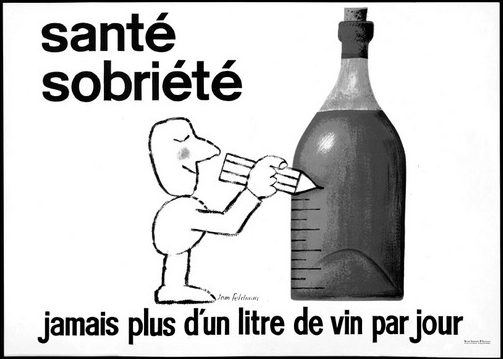 |
| 1955-7 alcohol campaign |
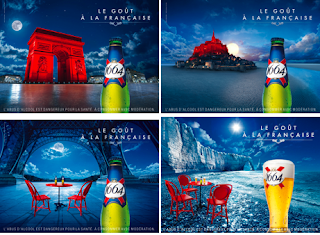 |
| Le Goût à la Française… (owned by Carlsberg, a Danish company) |
The Industrial Beer Giants
The massive swing in brewing trends during the course of the 20th century can be atributed to many factors. Pasteurisation and the development of other techniques allowed beer to be stored for long perods of time and transported long distances. The revolution in transport networks and industrial brewing techniques also meant that large quantites of cheap beer could be produced and distributed all over the world. Unfortunately this has had the inevitable commercial effect of pricing out independant operators and reducing choice. Despite efforts by the large breweries to diversify with products like Desperados and different artificially flavoured designer beers what we are left with today is a generally tasteless and uniform product. A further issue is that the majority of bars and pubs are tied to a particular commercial brewer and are therefore locked into that supplier and legally can’t stock local artisan local beers.
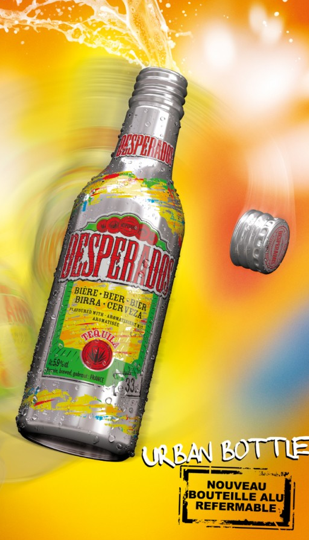 |
| Artificially flavoured lemonade beers aimed at young drinkers |
A Change in Drinking Trends
Beer consumption in France has been falling for decades and is now as low as 30 litres per capita each year compared to 57 in 1980.
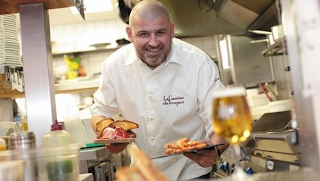 |
| The new culinary beer movement! |
TV chef Christian Etchebest has recently taken on the role as spokeperson and ambassador for beer in France. In promoting the drink he has stated that beer remains popular but not very well known to the general public with a “generation brought up on wine”. This year he has taken on the role of the ‘godfather’ of the 8th edition of the Heineken beerology competition aimed at training future beer ambassadors in the hospitality industry. His aim is to educate and initiate people in the service and tasting of beer, pairing with food and to spread the values generally associated with the drink such as: conviviality, good times and the spirit of rugby!
Various regions in France such as Lille, the Nord Pas de Calais and Brittany have always traditionally had strong local brewing cultures and these continue today to a larger extent. Biere de Garde following on from the Belgian tradition has a strong following as does Pelforth and Ch’ti. Trappist beers continue to be popular and a variety of seasonal Christmas and March beers can be found in the large supermarket chains. A number of specialist bars and shops have also sprung up in recent years chiefly represented by 3b’s and V&B which offer a decent selection.
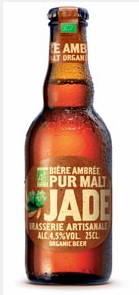 |
| A decent brew |
Despite the relative diversification and reactivity of the larger companies there is a rising demand for a return to decent local breweries producing small quantities of quality beer you can trust.
The Brewers Countermovement
As in numerous beer drinking countries France has seen a recent resurgence in the demand for local organically made quality beer. Conversly to commercial sales those of microbrewed beers have risen sharply over recent years. Rather than a harking back to a more golden age it would seem that this is more a natural reaction to the general lack of choice on the market and the mass produced chemical nature of the modern drink. In a similar spirit to the homebrewing movement in the UK small independant producers here are coming back with a vengeance.
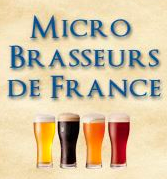 |
| With links to local breweries, health advice, beer menus etc. |
Over the last ten years the number of micro-breweries here has literally exploded. According to Robet Dutin, author of the ‘Annuaire des brasseries françaises’ since its first year of publication in 2008 the number of local producers in France has jumped from 293 to over 500 in 2013. The majority of these microbreweries have appeared more though a love of beer rather than a commercial motivation. They tend to have an ecological and fair trade approach, a local distribution and are born out customer demand for quality. The Assiciation of French Brewers has a commission for smaller brewers which has been set specifically set up to look after the local players.
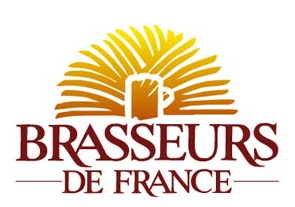 |
| The future is looking bright! |
To further help matters, this year a new excise duty on beer has targeted overseas brewers (the three mains being Danish Carlsberg who own Kronenbourg – 70% of the market, Dutch Heineken and Belgian InBev who own Stella). With the tax being 16 times that on wine which they obviously claim it is prejudiced against overseas companies. In any case it is set to rake in over €480 million for the government and should assist the local brewer’s market. François Hollande is clearly a beer enthusiast by his attendance at the 2013 Salon d’Agriculture in Paris for the ‘Médailles des Brasseurs de France au Concours Agricole‘ – or National French Local Brewer’s Competition. Good lad.
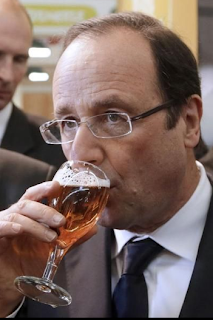 |
| Setting the good example (without mentioning a certain actress…) |
The Artisan brewery movement in the Gironde
Independant Artisan Breweries :
Aliénor :
Aliénor (presumably named after Eleanor of Aquitaine) is run by a Belgian guy called Laurent Lefebvre who arrived here in 2006 and began producing not long after. After brewing for a couple of years in his house he moved to a new premesis in August 2012 which was used before in winemaking. He is based in Saint-Caprais-de-Bordeaux and welcomes visitors from Monday to Saturday in the late afternoons.
Beers on offer are Aliénor Blonde (6.5%), Aliénor Blanche (5.9%) and Aliénor Brune (6.5%). In addition he hires out beer barrels for events along with the CO2 draught apparatus and can happily conduct on-site tastings.
It’s available at the Vintage Bar next to Porte Caillou, Le Lucifer down from Place Victoire and a variety of shops.
l’Entre-Deux-Bières :
Based in Mauriac, about 30km inland of Bordeaux, E2B as otherwise known is the brainchild of Karin Forrer. An ex pharmacist she has transfered her expertise to the highly worthy endeavour of professional brewer. Having taken a brewer’s diploma at the University of La Rochelle she offers a range of organic beers with an ecological approach to suit all tastes. They also have cool labels on the bottles..

L’Entre 2 – a blonde beer at 4.5% it is brewed with Organic Barley Malt and has a flowery hoppy aroma.
Blanche Palombe – A refreshing zesty wheat beer brewed with organic wheat and spelt grown by the neaby medieval Blasimon abbey.
La Tchanquée – A magnificent 4% Oyster Stout this baby is a personal favourite. Brewed to a traditional Scottish recipe it’s made with roasted barley and an oyster infusion to produce a dark tasty brew.
La Baine – a robust 7% ale brewed with a combo of ‘blonde’ malt and caramel it packs a punch.
L’Etoile de L'(a) Mer – At 5.5% the latest addition to the range it has a strong hoppy flavour with the addition of sea-salts.
Aside from the beers there is a Ginger Lemonade which is made with an Anglo-Saxon palet in mind and goes down well with local ex-pats.
L’Entre-Deux-Bières is available all over Bordeaux but has an owner who is keen to produce quality over quantity. Karin is also keen to keep distribution local (despite offers to expand overseas) and wants to limit the carbon footprint from larger scale transport. To pick one up you can try the Vintage, West Coast Burgers
and the associative bar Le Petit Grain on Place Max Dormoy. There are also a number of other shops and bars as well as regional night markets such as Montsegur to hunt E2B down (via the website). Alternatively if you happen to be in Lacanau Ocean looking for a decent brew, get over to the Cave Chez Kiki on 7 Avenue du Mal des Logis Garnung
Gasconha :
Brewed in Pessac they produce additive and preservative free beers based on the English real ale tradition as well as the Bières de Garde of the north. The equipment comes from the Canardou organic brewery in the Dordogne and can produce between 800 and 1000 litres a go. The beers are refermented in the bottle as with many Bières de Garde giving them extra fizz and mousse and are available in 33cl and 75cl bottles as well as the barrel. Both passionate masterbrewers and beer aficionados Vincent and Nathanaël welcome visitors to the brewery all year round Monday to Friday 8am to 6pm. Here’s what happened when I went to meet them… http://bordeauxexpats.blogspot.fr/2013/11/the-beerdeaux-chronicles-visit-to.html
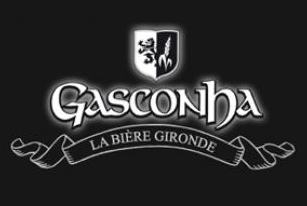 |
| Capturing the spirit of the Sud Ouest |
The Gasconha range :
Gasconha Seigle – A 6% Rye beer it has rustic wheat beer characteristics and dried fruit overtones. Best served from 8°C to 11°C.
Gasconha Brune – Traditionally brewed, at 7.5% it hits hard. With caremelised and roasted malts as well as a hint of bitter orange it has a generous flavour not to be taken lightly!
Gasconha Ambrée – 6% with roasted and smoked malts it has caramel and coffee flavourings. Superb as an aperitif it also goes well with red meat and is best served at 8°C to 12°C.
Gasconha Blonde – A moussy lager and at 5.5% it goes perfectly with cheese and white meats. Using a combo of 4 malts and English and German hops it has character!
Gasconha Blanche – A 5.5% German style wheat beer it is described as rounded and velvety with floral and aniseed notes. Goes well with seafood and salads and served between 6°C and 8°C.
Gasconha de Printemps – Evoking Spring there are hints of Jasmin as well as caramel and dark malts. 6% and only available in 33cl.
Gasconha de Noël – A rich festive 6% Christmas beer made with Aquitaine honey. Traditionally brewed with spicy overtones this baby is guaranteed to warm up the winter.
Alouette:
Mascaret :
Based in Rions about 30km south of Bordeaux next to the Garonne the Brasserie Artisanale de Mascaret is part of the Château Maine Pascaud who also produce wine, have an event space and run a Gite! The owners Fabrice and Pauline started brewing in 2010 and have between them a host of brewing, viticulture, oenology and travel experiences. With an organic certification their concept is to create ‘a great beer in the region of great wines’.
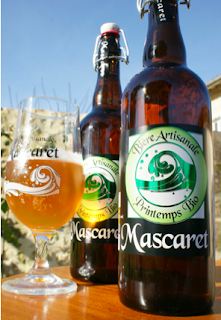 |
| Available in outlets all over Bordeaux |
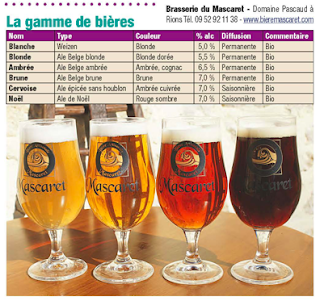 |
| The fine selection… |
Mascaret have a range of 6 organic beers available in 33cl and 75cl :
Blonde Bio Grande Cru – A traditional Belgian 5.5% lager brewed with Pilsen and Vienne malts and 3 varieties of aromatic hops. Available in 30 litre barrels and recommended to be drunk in a Belgian style tulip glass to give the right level of mousse.
Ambrée Bio – A creamy 6% brew with dark caramel overtones ingrediants also include biscuit malt. Perfect as an apero and matches well with cheeses such as Roquefort and Fourme.
Blanche Bio – A 4.5% – 5% wheat beer described as ‘feminine’ it has orange tones and is summery and festive. As with all wheat beers drink this one freezing cold and it goes well with seafood.
Brune Bio – A strong English style Brown Ale made with 5 different malts, hops and spices. At 7% it bites and works equally as an aperitif as with a meal or dessert. A winter style beer there are elements of cocoa, dark chocolate and liqourice.
Bière de Noël Bio 2012/2013 – A spicy 7% Christmas beer brewed in the Northern French/Belgian style. Full and spicy with hints of aniseed and liqourice. A new recipe is produced every year so look out for the 2013/2014 in the coming months.
Bière de Printemps 2013 – Light and tasty (% not shown but probs around 6%) made with fresh hops. Pick one up today!
Mascaret have a good distribution in the region and is available in Auchan Meriadeck amongst others as well as E.Leclerc, V&B and the BioCoop shops in town. They are present in several of the bars previously mentioned and also sell in the Paris region. Nearer the brewery there is an associative cafe/bar in Langoiran which along with the cinema sound pretty decent. As an interesting sideline they run 1/2 day workshop brewing courses which would make a great day out or present and offer the chance to create your own beer. There is also a free ‘Porte Ouverte‘ festival in May with a local producers market, jumble sale, shows for kids and brewery visits as well as a medieval street festival in Rions in July – hold the dates for 2014!
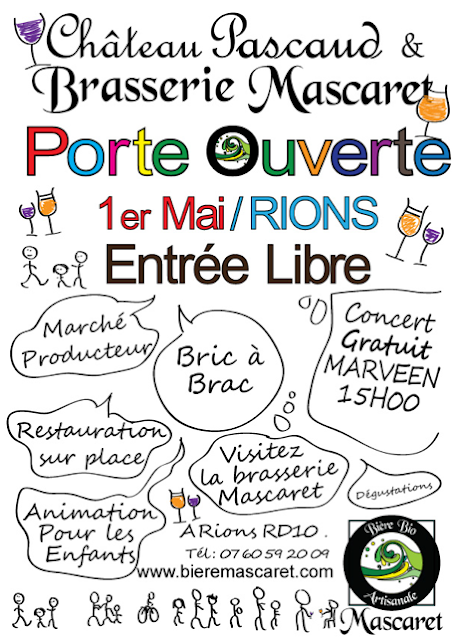 |
| Their Spring festival in Rions – take paracetamol… |
Artisan Brew Pubs :
The Fleur d’Houblon :
An Alsace concept restaurant on the Villenave d’Ornon shopping complex – just off the rocade south of Bordeaux, you need a car (therefore non-drinking designated driver) to get to this place. However it’s still worth a visit to taste the Franco-Germanic brews, watch a jazz concert and get stuffed on Sauerkraut and Flammeküche. They have private party rooms to hire a first floor terrace which can hold events for up to 130 people. There is also a Munich style beer festival in mid September for which they brew a special Munich beer which can be downed out of the epic Giraffe beer towers.
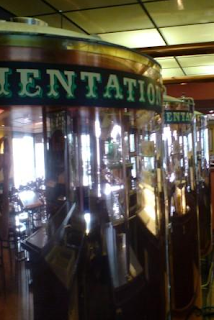 |
| On site brewing tanks |
They produce 8 brews on site including the seasonals which are served in awesome tall handle pint jars :
La Blonde – A slightly bitter lager made with aromatic hops and grilled malt. Light and fruity and best served between 6°c and 8°C.
L’Ambrée – A heavier and darker beer with caramel tones it is made with a mix of 4 malts and goes well with main courses.
La Blanche – Brewed with a mix of malted barley and wheat this light citrus beer is a thirst quencher! Goes well with fish, white meat, grills and other suumer mains.
La Girondine – A special red fruit beer brewed all year round this has hints of blackcurrant, blackberry and raspberry; there are also traces of chocolate and caramel. The perfect companion to a ‘magret de canard’, a Flammeküche or cheeseboard.
Brewed seasonally there are also the Bière de Munich, Bière de Noël, Bière de Printemps and Bière d’Eté.
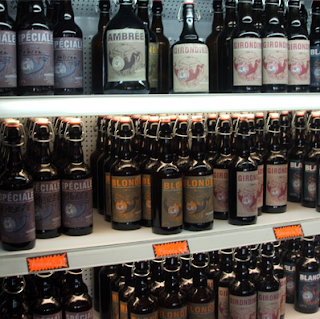 |
| Classic Alsace style bottles |
To aid the flow of the amber nectar there are regular concerts with local artists ranging from Soul, Jazz, Rock and Country to Irish folk music and even a Slavic quartet!
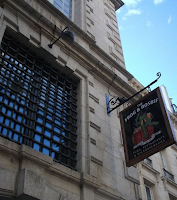 |
| The site of the old Bordeaux women’s prison… |
The Frog & Rosbif :
Well known and with 5 pubs in Paris as well as in Toulouse the Bordeaux branch is built in a former 16th century women’s prison. There are a plethora of special nights on offer from ‘Speed English’ to all night happy hour beer bonanza’s. The beer is brewed on site and there are 6 on offer :
Frog Natural Blonde – A 4.2% German Czech style lager with Bavarian ingredients. It’s unpasteurised and unfiltered and claims to beat keg beer hands down.
Maison Blanche – This 4.2% citrusy wheat beer with tones of orange peel and coriander. Perhaps they should drink more of this stuff in the actual White House.
Ginger Twist – A fizzy amber beer with ginger lemon and lime. Something different and 4.2%
Inseine – 4.4% this hoppy bitter the longest running Frog beer with over 2 million pints sold and 1.5 million insane hangovers achieved.
Dark de Triomphe – A full creamy stout, slightly bitter with roasted barley and chocolate malts and a decent strength at 5%.
Parislytic – Obviously fans of beer names that offer a humerous play on words (?) this is a dark malty ruby ale and the strongest at 5.2%
They have a great food selection to soak up the beers wich includes all the ex-pat favourites, plenty on offer for vegetarians and kids menus.
The Saint Léon :  This brasserie in Créon 20km South East of Bordeaux has it’s own beers brewed locally by a guy called Nicolas Hébert. They have a Blonde for €5 a pint and a Russe for €6, kids are welcome with their parents and can try the locally produced lemonade.
This brasserie in Créon 20km South East of Bordeaux has it’s own beers brewed locally by a guy called Nicolas Hébert. They have a Blonde for €5 a pint and a Russe for €6, kids are welcome with their parents and can try the locally produced lemonade.
The bar itself is almost a local community centre with a WiFi connection, mini library and piano. The chef offers a beer themed menu with local produce including – Duck Sausage à la bière or Beef à la bière and they have regular theme nights with card/board games and often improvised concerts. The local mayor Jean-Marie Darmian has even suggested that beer is one of the local products that gives Créon its reputation. They supply local associations and the sale of barrels is popular among sports clubs for ‘les troisièmes mi-temps’.
Nicolas Hébert is a strong advocate of beer culture over that of wine. In a recent interview he recalled how during a local ‘portes ouvertes’ Créon wine festival about 40 people turned up and conducted the tasting in quasi-silence with only 2 cases of wine being sold all day. A similar event held later on around the local beers brought in over 250 people who were all chatting away after 5 minutes and they had sold several hundred bottles!
 This infamous Bordeaux eco-zone has long been the champion of the town hall in its quest for the ultimate socio environmentally friendly communal living and shopping collective. In any case there are loads of skaters down there and they have parties throughout the summer.
This infamous Bordeaux eco-zone has long been the champion of the town hall in its quest for the ultimate socio environmentally friendly communal living and shopping collective. In any case there are loads of skaters down there and they have parties throughout the summer.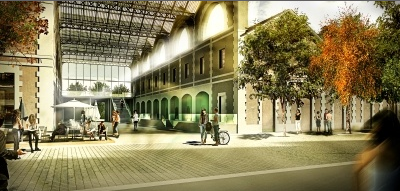 |
| The future of Bordeaux (??) |
Other Beer Venues of Interest
L’Oiseau Cabosse – Nestling on the cosy Rue Sainte-Colombe with a couple of other bars this place stocks a local Isle d’Oléron brew, La Bière des Naufrageurs (there is a donkey on the bottle).
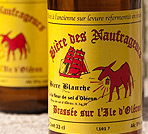 |
| The donkey beer |
La Muse Cafe – On the other side of the Gare St Jean (10 rue Brascassat) this resto/bar stocks Mascaret and has fun theme nights such as Murder Parties and the Zombie Crew!
Chat Noir Cha Vert (47 Rue des Faures) is another alternative cafe in St Michel. They stock Mascaret and other alternative stuff and have a terrace.
 |
| Not for chickens |
Au Poulailler in Begles (Place Du 14 Juillet) – without a chicken in sight, this bar/cafe/resto/meeting place is however advertised as the place where people go to ‘cackle together’. Mascaret by the bottle amongst others.
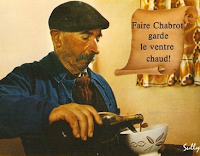 |
| Papie strongly recommends you get down there |
Le Chabrot – Next Porte Caillou this trendy bar has Belgian beer on tap, a delius menu (especially the charcuterie) and if it gets too hot you can go next door to get the best homemade ice cream in town at the Frozen Palace.
Les Caves d’Ausone – Just opposite Le Chabrot and arguably Bordeaux’s best Wine and luxury Spirits shop this place has a decent selection of alternative beers. The rum selection is also amazing.
Le Cafe des Moins – a Belgian medieval cave in St Michel (with the appropriate address of rue des MeNuts) this place has a happy hour from 7-8pm and a selection of Belgian and French local beers. Worth a visit to try the 13% Black Albert which will leave you without certain key mental faculties.
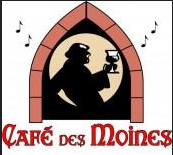 |
| BE CAREFUL!! |
The Future of Beer in Bordeaux
With any luck, word will spread of all our local brasseurs and more cafes and restaurants will start stocking their fine selection of beers. Many of the bars and pubs I contacted had no idea that artisan breweries actually existed in Bordeaux so I promptly told them! Some of the main pubs are under license for draught but can still theoretically stock the bottles. A beer festival on the Quais or somewhere in the Old Town is a welcome idea to many of the local brewers. With the partnership of a cafe like the Vintage it could happen in 2014. Woll beer (a German owned brewery with roots in Hossegor in the Basque country) has proposed some kind of event around the skating scene at the Darwin Project. Combining the surf/skating scenes with artisan local beers could be a winning combo at some point. As for the question of whether beer has a place in the wine capital of the world, the final words go to beerologist Hervé Marziou : (trans) “We tend to forget that until the 1950’s every region of France had their own local brewery.. as with beer in other wine growing regions such as Alsace, the brewers sold their production to the wine makers. What better after a hard day’s grape picking than a cheeky beer”
Sounds good to me…

